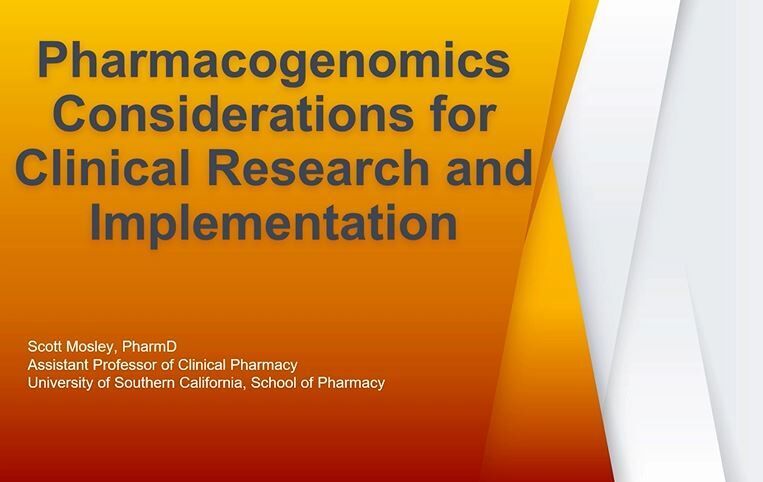Objectives
- Explain how genetic variation influences response to drug therapy
- Introduce approaches to discover pharmacogenetic associations and to evaluate the clinical utility of pharmacogenomics in clinical practice
- Summarize CYP2C19 genetic variability in ACS patients receiving clopidogrel post PCI
Precision Medicine and Pharmacogenomics
- Some patients are responders vs. non-responders vs. at risk for other conditions
- Gartner’s Hype Cycle
- Describes the trend of expectations regarding innovation, expectations, and actuality
Pharmacokinetics and Pharmacodynamics
Translational Research
US FDA Approval of New Drugs
- 694 drugs approvals over past 20 years
- 178 or 26% of those have PGx labeling
Biomarker-drug pairs approved per year has grown since 2000
Pre-market Considerations
- FDA has guidance published in 2013
- Consider collecting DNA during drug development
Percutaneous Coronary Intervention (PCI)
- Clopidogrel tablets – helps prevent clots
- Individuals who are poor metabolizers should not take this medication
Clopidogrel Metabolism
Alternatives to Clopidogrel
- Post-market researchers showed that there are alternatives
Genetic Subtypes
- Prasugrel Evidence: Secondary Prevention
- Reduces ischemic events with a higher rate of bleeding
- Prasugrel vs. Clopidogrel by Genotype: Genetic Sub-study of TRITON TIMI-38
- Risk vs. benefits
- ADD
- CPIC Guidelines
- CPIC = Clinical Pharmacogenetics Implementation Consortium
- ADD
Genetic Sub-studies Benefits and Limitations
- Benefits
- Help determine effect of genetic markers in selected populations
- Responder vs. non-responder
- Outliers (toxicity)
- Help determine effect of genetic markers in selected populations
- Limitations
Randomized Clinical Studies
- Different strategies to test value of incorporating PGx into clinical care
- Superiority
- Non-Inferiority
- TAILOR-PCI Study
- Results
- Inclusion and Exclusion Criteria
- Popular Genetics Study Results
Randomized Clinical Studies Benefits and Limitations
- Benefits
- Good randomization will “wash out” any selection bias
- Can determine causality
- Help guide decisions for allocation of healthcare resources
- Limitations
- Not clinical feasible or necessary for any pharmacogenomic applications
- Rigorously designing a scientific trial is not always ethical
- Financial constraints
Clinical implementation and feasibility studies (pragmatic trial)
- IGNITE: Pharmacogenetics Working Group
- Real-World Evidence
- Results
- Clinical Decision Support Example
- Benefits
- Broad view of an intervention
- Allows for economic analysis
- Identified systematic, personnel, and technological barriers
- Limitations
- Possibly overestimating benefits and underestimating harm
- Often involves complex interventions
- Investigators are responsible for recruitment, treatment, and follow-up of participants
Pharmacogenomics Research Resources
- CPIC
- Pharmagkb
- Pharmacogenomics Research Network
- Clinicaltrials.gov
Summary
- PGx can be used to guide specific drugs with clinical evidence
- Resources, like Pharm GKB and CPI C guidelines, can help with PGx considerations for research design and clinical recommendations
- Opportunity to advance PGx research throughout translational spectrum
- Clinical studies are warranted in diverse patients populations to determine the utility for pharmacogenomics and deliver reliable care

